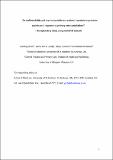Files in this item
Do multimorbidity and deprivation influence patients' emotional expressions and doctors' responses in primary care consultations? - An exploratory study using multilevel analysis
Item metadata
| dc.contributor.author | Zhou, Yuefang | |
| dc.contributor.author | Lundy, Jenna-Marie | |
| dc.contributor.author | Humphris, Gerald Michael | |
| dc.contributor.author | Mercer, Stewart W | |
| dc.date.accessioned | 2016-06-15T23:32:52Z | |
| dc.date.available | 2016-06-15T23:32:52Z | |
| dc.date.issued | 2015-09 | |
| dc.identifier | 193152880 | |
| dc.identifier | 7e7af9f0-5415-460f-8165-4ccee9935f8f | |
| dc.identifier | 84940959664 | |
| dc.identifier | 000360870200004 | |
| dc.identifier.citation | Zhou , Y , Lundy , J-M , Humphris , G M & Mercer , S W 2015 , ' Do multimorbidity and deprivation influence patients' emotional expressions and doctors' responses in primary care consultations? - An exploratory study using multilevel analysis ' , Patient Education and Counseling , vol. 98 , no. 9 , pp. 1063–1070 . https://doi.org/10.1016/j.pec.2015.05.026 | en |
| dc.identifier.issn | 0738-3991 | |
| dc.identifier.other | ORCID: /0000-0002-4601-8834/work/64033832 | |
| dc.identifier.uri | https://hdl.handle.net/10023/8995 | |
| dc.description.abstract | Objective: To explore whether and how patient multimorbidity and socioeconomic deprivation conditions might influence patients’ emotional expression and doctors’ responses in the general practice (GP) consultations. Methods: Video recordings of 107 consultations (eight GPs) were coded with the Verona Coding Definitions of Emotional Sequences (VR-CoDES). Multilevel logistic regressions modelled the probability of GP providing space response, considering patient multimorbidity, deprivation conditions and other contextual factors. Further multinomial regressions explored the possible impact of multimorbidity and deprivation on expression of and specific responses to patients’ emotional distress. Results: It was less likely for GPs to provide space as the consultation proceeded, controlling for multimorbidity and deprivation variables. Patients with multimorbidity were less likely to express emotional distress in an explicit form. GPs were more likely to provide acknowledgement to emotions expressed by patients from more deprived areas. Conclusion: Multimorbidity and deprivation may influence the dynamics of the GP consultations in specific ways. Rigorous methodologies using larger samples are required to explore further how these two variables relate to each other and influence cue expression, provider response and subsequent patient outcomes. Practice implications: Understanding how multimorbidity and deprivation impact on GP consultations may help inform future service improvement programmes. | |
| dc.format.extent | 395929 | |
| dc.language.iso | eng | |
| dc.relation.ispartof | Patient Education and Counseling | en |
| dc.subject | The VR-CoDES | en |
| dc.subject | Multimorbidity | en |
| dc.subject | Deprivation | en |
| dc.subject | Emotional distress | en |
| dc.subject | General practice | en |
| dc.subject | R Medicine (General) | en |
| dc.subject | NDAS | en |
| dc.subject.lcc | R1 | en |
| dc.title | Do multimorbidity and deprivation influence patients' emotional expressions and doctors' responses in primary care consultations? - An exploratory study using multilevel analysis | en |
| dc.type | Journal article | en |
| dc.contributor.institution | University of St Andrews. School of Medicine | en |
| dc.contributor.institution | University of St Andrews. WHO Collaborating Centre for International Child & Adolescent Health Policy | en |
| dc.contributor.institution | University of St Andrews. St Andrews Sustainability Institute | en |
| dc.contributor.institution | University of St Andrews. Health Psychology | en |
| dc.identifier.doi | 10.1016/j.pec.2015.05.026 | |
| dc.description.status | Peer reviewed | en |
| dc.date.embargoedUntil | 2016-06-16 | |
| dc.identifier.url | http://www.sciencedirect.com/science/article/pii/S0738399115002712#appd002 | en |
This item appears in the following Collection(s)
Items in the St Andrews Research Repository are protected by copyright, with all rights reserved, unless otherwise indicated.

